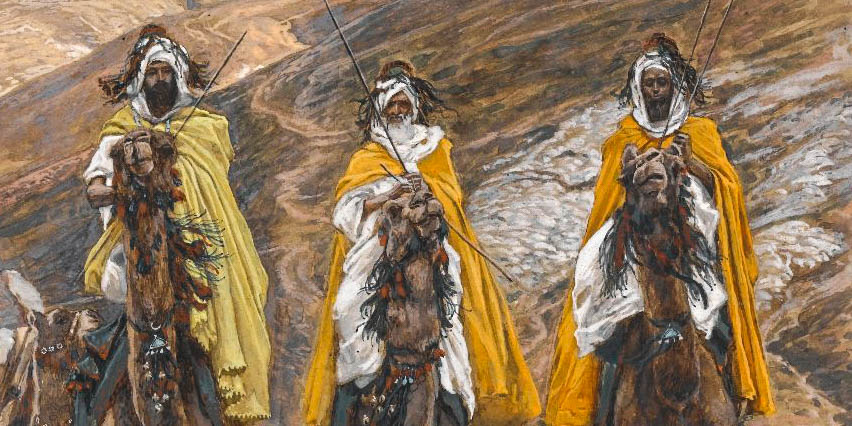
Epiphany A B C
Readings: Isaiah 60:1‑6 Ephesians 3:2‑3,5‑6 Matthew 2:1‑12
Beginning with the call of Abraham, God's plan for salvation history extends his blessing from Israel to all the nations (Gen 12:1‑3). Today we celebrate the feast of the Epiphany, the manifestation of God's salvation to all peoples. In the words of the responsorial psalm, we pray: "Lord, every nation on earth will adore you" (Ps 72:11).
The Isaiah reading looks forward to the time when nations will walk by the light of God's blessing shed upon Jerusalem. Speaking to exiles recently returned from Babylon, the prophet commands them to see their efforts to rebuild Jerusalem's walls and Temple as the beginnings of the epiphany of the Lord's light and glory piercing through the darkness of the whole earth. “Nations shall walk by your light,/ and kings by your shining radiance/. . . . For the riches of the sea shall be emptied out before you,/ the wealth of nations shall be brought to you/ . . . All from Sheba shall come bearing gold and frankincense,/ and proclaiming the praises of the Lord” (Is 60:3,5‑6).
Ephesians announces the fulfillment of Isaiah's prophecy by proclaiming “that the Gentiles are now coheirs with the Jews, members of the same body and copartners in the promise in Christ Jesus through the preaching of the gospel." Paul had to fight for the Gentiles’ right to be part of the new Messianic community without the duty of becoming observant Jews. According to Paul, Jesus' death and resurrection is the saving event, long anticipated by the prophets, which has opened the way for the Gentiles to become members of the people of God. This good news also calls Christians to a new way of living together in a love, rooted in Christ's own love for us. Our epiphany prayer for one another should be Paul's. “I kneel before the Father, from whom every family in heaven and on earth is named, that he may grant you in accord with the riches of his glory to be strengthened with power through his Spirit in the inner-self, and that Christ may dwell in your hearts through faith; that you may be rooted and grounded in love, may have strength to comprehend with all the holy ones what is the breadth and length and height and depth, and to know the love of Christ that surpasses knowledge, so that you may be filled with all the fullness of God” (Eph 3:14‑19).
Matthew's story of the adoration of the magi foreshadows that the Gentiles will receive the gospel. Many of the details of the Epiphany story‑‑ the character of Herod, the mysterious star, the magi‑‑ have their background in the traditions of the Old Testament. Herod's character is modeled on previous wicked kings who attempt to thwart God's promises, only to bring them to fulfillment. Like the Pharaoh in versions of the Exodus story, Herod becomes "greatly troubled" by the birth of "the newborn king of the Jews" and attempts to kill the child by ordering the massacre of the infant boys in Bethlehem. As a result Jesus, as God's son, must descend into Egypt, like his ancestors, and then be called out in fulfillment of Hosea's prophecy: "Out of Egypt I have called my son" (Hos 11:1; Mt 2:13‑23).
The star that the magi follow is also associated with an Old Testament story about another king who tried unsuccessfully to frustrate God's plan. When the Moabite king Balak confronts the Israelites in their march through the wilderness, he summons Balaam, a pagan seer (a magus), to curse them, but he can only pronounce blessing on God's people (see Numbers 22‑24). Among the blessings is the foreshadowing of a Messiah arising like "a star" out of Jacob. “There shall come a man out of Israel's seed,/ and he shall rule many nations/. . . . I see him, but not now;/ I behold him, but not close;/ a star shall rise from Jacob,/ and a man (scepter) shall come forth from Israel” (Num 24:7,17‑‑partially from Greek Septuagint).
In contrast to Herod, the magi are sincere Gentiles who cooperate with God's plan and, in fulfillment of the Isaiah text, come to "walk by (Israel's) light." Although they only have the astrological revelation provided by nature, the magi humbly come to Israel seeking fuller knowledge of where the child is to be born so that they may do him homage. When they learn from the Scriptures that the Messiah is to be born in Bethlehem, they continue their journey, again guided by the star. And when they see the child with Mary his mother, they respond with joy and in homage offer their gifts of gold, frankincense, and myrrh.





